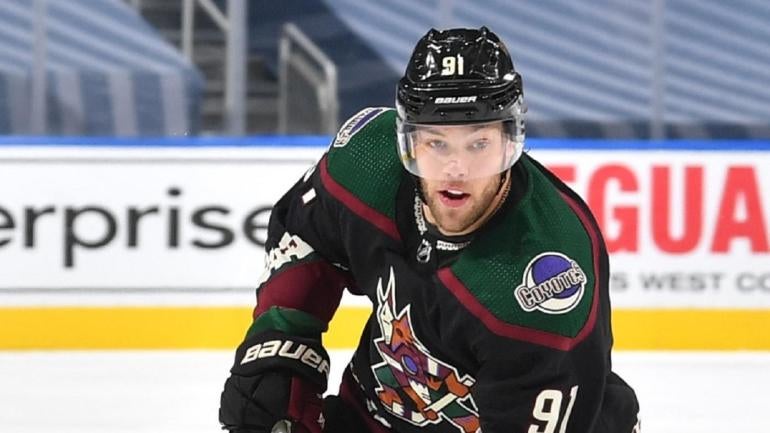
While we still don't know when the 2020-21 NHL season will start or how many games will be played, we do know where nearly all of this year's most sought-after free agents will be playing, whether they re-signed with their club or took their talents elsewhere. The team a player suits up for can have a dramatic impact on their Fantasy potential, so let's take a look at this year's biggest offseason free agent signings and how they may affect each skater's Fantasy value during the upcoming campaign.
Forwards
Taylor Hall – Signed a one-year, $8 million contract with the Sabres.
Hall decided to sign a one-year contract this offseason in hopes that a bounce-back performance in 2020-21 will lead to more lucrative long-term contract offers ahead of the 2021-22 season. He certainly picked a nice situation to do just that by joining the Sabres because he'll almost certainly be playing on the team's top line and first power-play unit alongside Jack Eichel, the first truly elite center he'll have been paired with since entering the league in 2010. A return to a 30ish-goal, point-per-game pace isn't an outlandish expectation for Hall in 2020-21.
Tyler Toffoli – Signed a four-year, $17 million contract with the Canadiens.
Toffoli spent most of the 2019-20 campaign with the lowly Kings, totaling 18 goals and 34 points in 58 contests, but he was dealt to Vancouver at the trade deadline, where he added six goals and four apples in 10 regular-season matches before chipping in two goals and two helpers in six playoff games. Now with the Canadiens, Toffoli's role and thus his production shouldn't change too much in 2020-21, as he'll still have a top-six assignment, likely with Nick Suzuki and Josh Anderson on the Habs' second line, and he'll see plenty of ice time with the man advantage while skating on Montreal's second power-play unit. The 28-year-old winger has more often than not been able to chip in around 25 goals and 50 points over the course of a season since becoming a full-time NHLer in 2013, and that shouldn't change during the upcoming campaign despite his change of scenery.
Mike Hoffman – Remains unsigned.
Hoffman is essentially the last big-name forward still on the market at this stage of the game, but I suspect he won't remain unemployed for long once the NHL announces a firm start date for training camps. Some of his likely landing spots include Nashville, Columbus and even Boston, so while the Bruins would obviously present the best situation in terms of upside for Hoffman, regardless of where he ends up, it doesn't appear likely that he'll be joining a bottom-barrel team that could significantly hinder his scoring potential. It's safe to assume Hoffman will be getting top-six minutes and plenty of power-play usage with whatever club he ends up signing with, making him a safe bet to once again produce at around a 30-goal, 60-point pace in 2020-21.
Defensemen
Alex Pietrangelo – Signed a seven-year, $61.6 million contract with the Golden Knights.
Pietrangelo was arguably the biggest prize available on the free-agent market this offseason, and the rich got richer when he signed a seven-year deal to join the Golden Knights in October. The 30-year-old blueliner hasn't totaled less than 13 goals and 41 points in any of the past four campaigns, and he generally produces closer to 15 goals and 50 points over the course of a full season. That shouldn't change in 2020-21, as although his power-play production may take a slight hit since he'll likely have to settle for a spot on the second unit with Shea Theodore locked in as the top unit's quarterback, he'll still be getting loads of ice time while skating on the Knights' top pairing, and Vegas' supporting cast will be just as good if not better than what the Blues have iced in recent seasons. Pietrangelo should be considered a top-10 option at his position heading into this year's Fantasy drafts.
Torey Krug – Signed a seven-year, $45.5 million contract with the Blues.
Krug has established himself as one of the NHL's premiere power-play quarterbacks, having racked up at least 24 points with the man advantage in each of his last four seasons with the Bruins. Boston has had one of the league's best power plays in recent years, but St. Louis' unit wasn't far behind in 2019-20, converting 24.3% of its opportunities compared to the Bruins' 25.2% success rate. The Blues' No. 1 power-play unit obviously doesn't boast a trio as absurd as that of Boston's David Pastrnak, Patrice Bergeron and Brad Marchand, but it still has plenty of talent, and adding Krug to the mix should help keep it near the top of the league in terms of conversion rate for a second straight year in 2020-21. The Blues don't have as many household names as the Bruins do up front, but they're a well-rounded club that should remain one of the better teams in the West this season, so there's no reason to believe Krug's offensive production will decline much if at all, particularly considering he does a lot of his damage on the power play. A 50-plus point pace with around 50% of his offensive output coming on the power play is a near certainty for Krug this campaign.
Tyson Barrie – Signed a one-year, $3.75 million contract with the Oilers.
Barrie spent the 2019-20 campaign with the Maple Leafs, posting a respectable five goals and 39 points in 70 contests, but it was a bit of a disappointment following his 14-goal, 59-point performance with the Avalanche in 2018-19. Now with the Oilers, Barrie is expected to skate on Edmonton's second pairing and first power-play unit in 2020-21, a unit that includes Connor McDavid and Leon Draisaitl and which led the league with a 29.5% conversion rate last season. While Barrie's play in his own end leaves something to be desired, Fantasy managers should primarily be interested in his power-play production, which should improve dramatically during the upcoming campaign. A return to the 14-goal, 55-plus point form he displayed during his last two years in Colorado is a definite possibility for Barrie this season.
Goalies
Robin Lehner – Re-signed with the Golden Knights on a five-year, $25 million contract.
Lehner spent most of the 2019-20 season with the Blackhawks, posting a 16-10-5 record while maintaining a respectable .918 save percentage in 33 appearances behind Chicago's terrible defense, but he was traded to Vegas at the deadline and went on to flourish with the Golden Knights. Lehner made just three starts for his new team before the regular season was cut short, winning all three while posting a 1.67 GAA and .940 save percentage, but he went on to overtake Marc-Andre Fleury for the Knights' starting gig during the playoffs, compiling a 9-7-0 record while registering a 1.99 GAA and a. 917 save percentage in 16 starts. The 6-foot-4 Swede will enter the 2020-21 season as Vegas' No. 1 netminder, but Fleury will still be in the mix, so it wouldn't be surprising to see this turn into a 1A-1B situation. Regardless, there will be plenty of wins to go around for the two netminders as the Golden Knights once again figure to be one of the top teams in the West this season, and Lehner should be able to post a save percentage higher than .920 and a GAA lower than 2.50 behind Vegas' stout defense, making him one of the most attractive Fantasy options at his position heading into this year's drafts.
Jacob Markstrom – Signed a six-year, $36 million contract with the Flames.
Markstrom was considered by many to be Vancouver's MVP last season, compiling a 23-16-4 record while registering a 2.75 GAA and .918 save percentage. Looking ahead to 2020-21, he'll be joining a Calgary team that finished with a nearly identical record as the Canucks did last year, so a similar win-loss ratio can be expected from Markstrom, as with the exception of T.J. Brodie, the Flames haven't suffered any major losses this offseason, and they added Chris Tanev on the back end to help offset Brodie's departure. David Rittich will serve as Markstrom's backup this season, but Markstrom is a vastly superior netminder, and Calgary didn't drop $36 million to have him enter a timeshare with Rittich, so it's safe to assume the former Canuck will get a large majority of the team's starts this year. Fantasy managers probably shouldn't plan on deploying Markstrom as their No. 1 option in goal this season, but he'll make for a high-end No. 2 option in most formats.





















